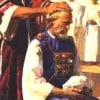Samaritans and Karaites

I find it truly amazing that no matter how many centuries may pass in the blink of an eye, there is always one issue of permanence that is a guaranteed constant in this universe and that is that amongst Jews, regardless of which sect I might be referring to, we will argue to the point of death, with no other rewarding purpose it would seem than the sheer enjoyment of the argument itself, the revelling in the sheer pettiness we can exhibit, and the thrill of the irrational behaviour we can exemplify. And what is even more amazing is that the underlying principle behinds most of these confrontations is the assertion by one of the participants that they are a 'better Jew' than the other. I'm not certain what a 'better Jew' actually means in the true scales of our lives. If it's reference to superior mastery of the Torah, then I'm afraid we're all merely students when it comes to that assertion. It will take longer than a lifetime to even consider oneself qualified in practicing Torah let alone mastering it. Perhaps it'a a reference to being somehow closer to God than the other person but I don't know where they would find the yardstick to make that assertion either. In history, very few have ever approached God and in all likelihood there will be jus as few in our future. Then again, it might be an issue with birthright, but as I've explained in several other articles, carrying the Hebraic genes does not necessarily mean you're of a decent character and we must remember we are judged on our actions, not on our line of descent. God made no distinction between the natural born Jew and the one that coverted to Judaism. David as a descendant of Ruth was proof enough of that. Even the product of a convert could become King of Israel which should end that argument quickly. And finally I heard it said that it is a matter of which Torah you read and in which language, a clear reference to the slight variations that exist amongst the various sects. As Karaites, depending upon which community we originated from there are Torahs in different langauges such as Arabic, Tartaric, English, and of course Hebrew. We may wish to believe that the Hebraic version is a 100% reproduction of the original handed down by Moses to the elders but with human involvement that essentially would be an improbability if not an impossibility. Therefore, for anyone wishing to establish the superiority of one version of the Torah over another, in truth it cannot be done since all of our various versions in their multitude of languages are based on the original document which no longer exists. Fortunately Karaism has always promoted a policy of supporting the Torah to be written in whichever language was primary in the town or city where Karaites were domiciled. As a result, you have Karaite Torahs in all the languages mentioned previously and these are all based on the Masoretic Text (MT). But this raises another interesting issue; what if a Torah was based on the Samartian Text. Would that make those following it any less Jewish than their MT counterparts? I think not, for as we examine the commonalities between Karaism and Samaritanism, we see that to do so would only be condeming ourselves.
Samaritan History
Embattled, surrounded, practically forced to the point of extinction, the Samaritan community has hung on its efforts to survive against insurmountable odds. And survive they have for 2700 continuous years even though doing so meant they bore the wrath and animosity of their Judaic brethren. That is not to say that it was without justification. The attempt on their part to convince Alexander the Great to attack Jerusalem so that they could seize the city and raze it to the ground was not an act that could be easily overlooked or forgiven. Once more, it would appear that the bitter rivalry as to "Who's a Better Jew," syndrome that I spoke of previously had its roots long ago in our development. Even in 330 BCE it would still seem to have been a major component and flaw of our character whether Samaritan or Judean. Why such intense hatred between brothers can only be consigned to the bitter feud that evolved from the splitting into the two kingdoms during the reign of Reheboam. We may think of the northern kingdom being accursed by God, but when you take into consideration the sheer number of prophets that were based in the north you realize that God had not abandoned them, so what right had we to do so?
And after the fall of Israel in the north, did those of us in the south try to rescue the remnant? Did we offer them shelter against the onslaught of assimilation? Did we give them aid to remain vigilant against the introduction of the foreign religions into their services? Did we offer them priests from the overflowing numbers that filled the upper city of Jerusalem? The answer was no to all of these. The decision was made to let the remnant of the northern kingdom perish because the seeds of animosity had been sown too deep to harvest anything but a foul crop. But the north didn't evaporate as had been expected. Two new families filled the void left behind by the fall of kings, these were the Tobiads and the Sanballets. Together they re-established a working government and economy, preserving the religious practices in the gathering place on Mount Gerzim and therbey presenting a true challenge to the south.
With the return of the socially elite accompanying Ezra the high priest from Babylon, the opportunity existed to heal the rift once and for all. Under the guize of religion the offer of the Samaritans to help build the Temple and reunite with their southern brethren was rejected but the reality is that the politics was a more significant factor in this decision. During the time of their absence, the aristocracy of the south had lost much of their wealth and now the real power in the region were these two northern families. Even Ezra would have been challenged by the fact that the services in the north still were under the direction of descendants of the High Priest Hilkiah, equal if not superior to his own standing. As such, jealousies would have fuelled the ancient hatreds as much or more than any rational justification.
Samaritans and Karaite Beliefs
It must be remembered that once rejected, the Samaritans would have dug in their heels and clung tenaciously to the ancient laws and customs in an effort to demonstrate that they performed the services and practices of the religion to a superior degree than their southern neighbours who were busy reforming the religion upon their return from exile. Not unlike the Sadducees in the south, the Samaritans would have centred their religious structures and performance around the priestly perogatives, maintaining a centralized religious cult as had been the way of the past. We know from the experience in the south that as soon as the Jerusalem Temple had been destroyed the Pharisees asserted their control over the day to day life of the people, removing the exclusive rights of the priests and then going on to rewrite the entire body of the law to conform to their own interpretations and beliefs, which they later called the Talmud. How can we be so certain? From the work of Geiger on the Targum Pseudo-Jonathan which served as a depository for the remnants fo the ancient Sadducean-Samaritan-Karaite traces of the ancient halakah. The ancient and therefore presented by God through Moses Halakah that was suppressed by the Pharisees and intentionally concealed from the Jewish population. So it can be assumed that the model of Samaritan practice and law closely resembled the pre-Pharisaic period which would then suggest that it would have been very Karaite in its conduct just as Geiger concluded. Written around the time that the Talmud and its new laws or halakah were being introduced, Pseudo-Jonathan was written by someone determined to preserve the old ways and much of its content reflects the ante-Pharisaic traditions. Geiger demonstrated that these 'anti-traditional' laws are both common to Karaites and Samaritans. As an example, the interpretation of Leviticus 19:24 by the rabbis regarding the the fruit of the tree in its fourth year is said to be like the second tithe, to be transported and consumed by the owner within the walls of Jerusalem. But in Pseudo-Jonathan it translates 'kodesh helolim' to mean that it is to be given to the priests or redeemed by its owner, exactly as both the Samaritans and Karaites interpret it.
Another point of agreement between Karaites and Samaritans regards the observation of the fiftieth day after the waving of the sheaf (omer) that it is to be offered on the morrow after the sabbath. The rabbanites interpret it to mean on 'the day after the holy convocation' which to them means the 16th of Nisan but the Sadducees saw it to mean the day after the weekly sabbath that occurs during the feast of unleavened bread so that the Feast of Weeks is celebrated always on the first day of the week. This Sadducean interpretation is the same as that used by the Samaritans and Karaites.
The list of similarities is quite extensive and it only demosntrates that both the Karaites and Samaritans practice and interpret the Torah identically in many circumstsnces. To do so can only mean that the interpretations of both sects is based on the Sadducean interpretation which was the origianl halakah of Judaism. Therefore to reject Samaritanism as a recognized path of Judaism by a Karaite would be in a sense like rejecting ourselves.
Neither Add Nor Subtract
Moses prohibited us from adding or subtracting from the Torah. Since the Samaritans we can assume were strict in their observance of this prohibition since their history has always been one of trying to prove themselves 'holier' than their southern brethren, then it becomes difficult to explain why there exist what Rabbanites have labelled as Samaritan additions to the Masoretic Text which forms the Samaritan Torah. But to rely on the Rabbinical statement that there were additions would be not dissimilar to believing Abraham Ibn Daud, the Rabbanite author of the Sefer ha-Kabbalah written in 1161 when he states that only rabbinical Judaism can be validated by its claim of being an uninterrupted tradition and all the rest such as Islam, Christianity, Karaism and Samaritanism are heresies. According to Ibn Daud, all heresy stems from Samaritianism and as a result of their errors there is a continued presence of unreformed idolatry exisiting in the world. In fact, Ibn Daud claims that the high priests Zadok and Boethus, the two major influences upon Karaism prior to Anan ben David both took refuge amongst the Samaritans and assumed the leadership of their temple on Mount Gerzim. Though Ibn Daud is erroneous in his claims, he does provide one kernel of truth and that is there are connections and similarities between Karaism and Samaritanism.
Firstly, it should be established that the Samaritan Torah is longer than the Masoretic Text. It is written in the Samaritan alphabet which is different from the Hebrew alphabet which didn't get widely used until the exiles in the south returned from Babylon. There alone should be the first clue that the Masoretic Text in its Hebrew alphabet was a rewriting from the older alphabet which provided the first incidence of change. Following the discovery of the Dead Sea Scrolls, which often were in agreement witht he Samaritan version of the Torah, it became somewhat more evident that the Masoretic text may have been the one that changed, primarily through deletions. Of the approximately six thousand instances in which the Samaritan and the texts Masoretic Texts differ, the Septuagint (LXX) version agrees with the Samaritan in two thousand of those cases. We can see an example of this fro Exodus 12:40 where both the Samaritan and the LXX state, "Now the sojourning of the children of Israel and of their fathers which they had dwelt in the land of Canaan and in Egypt was four hundred and thirty years." This differs from the Masoretic Text which only reads that the soujourning of the Children of Israel who dwelt in Egypt was 430 years. Historically, the Samaritan version would be more accurate as we know from the transition of the 17th to 18th dynasties in Egypt, there probably was only about a two hundred year period where the enslavement would have taken place, and probably another hundred years where the descendants of Joseph became established in positions of power prior to the changeover. Clearly the Masoretic text experienced a loss, most likely through scribal error, of this vital information providing an inaccurate history of the duration of the slavery. But that is not the only difference in Exodus that is quite noticeable. In Chapter 6 in the Samaritan versin, the people are quoted complaining to Moses that he should leave them alone to stay in Egypt and serve the Egyptians whereas that line doesn't occur until Exodus 14:12 in the Masoretic text, when the Children of Israel were already marching in the desert. When examined, it actually makes sense that they did say this when Moses first appeared to them, refusing to accept his leadership rathter than recount it much later as an afterthought.
Gramatically there are also differences between the two texts. Those improper gender differences that exist in the Masoretic text are not present in the Samaritan version which has appropriate gender agreement. This again suggests that the translation into Hebrew was being performed when the language was still young and being adjusted to, as in the post exilic period when it came out of Babylon.
One of the more interesting differences between the two texts is the use of the name Benjamim in the Samaritan Torah versus Benjamin in the Masoretic Text. At first one would point to the failure of the Samaritans to accurately record the name of one of Jacob's sons, but when one reads Genesis 44:20 in which his brothers explain to Joseph that their father has a son of his old age, that their brother is called בן ימים or 'the son of many days referring to his fathers old age at the time of his birth it makes more sense than being the 'son of the right hand'.
In Exodus 15:3 the Masoretic text says that "the Lord is a Man of War" whereas the Samaritan version reads as, "the Lord is mighty in War". It is surprising that the Lord would have been represented as a man, giving fuel to later Christian doctrines that claimed God could appear as a man. To do so was a lessening of God's stature, reducing him to an inferior creature like ourselves. Once again I have to think the Samaritan version may be more accurate and the Masoretic Text was a scribal error.
Therefore I think it is necessary that we examine the accusation of heresy on the part of the Samaritans and think that perhaps the heresy was on the part of the Rabbanites who have actually subtracted from the original Torah. That being the case, then how can we actually fight over the superiority of one text over another, of one Jew being preferred over another. These are things we do not know and because of our separation through our arguments and our fighting amongst ourselves for countless centuries as a result may never know. Let us practice instead what Anan ben David has encouraged us to do all along, read everything and make a decision based on rational, educated decision making processes and avoid the hystrionics that have done nothing but divide and weaken us as a people. I recall the words of Abraham Lincoln that "A house divided cannot stand," and I look at our house with it's shakey framework and fear that we will bring it crashing down through our own devices. As Karaites it is our duty to seek the truth. We must look beyond the deceptions, the distortions and the inaccuracies and find the true essence of God's words, whether it lies in the Masoretic Text, the Samaritan Torah, or even scrolls still to be found in the desert that we do not yet know.







